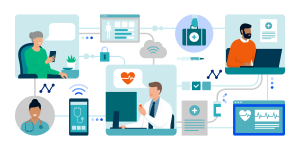|
|
The peer review process in healthcare is a critical mechanism for ensuring the quality, accuracy, and reliability of medical treatments and interventions. Traditionally, this process has been plagued by inefficiencies and delays, but technological advancements are now transforming how peer reviews are conducted. In this blog post, we will explore the current issues in the peer review process and how technology is modernizing this essential function for healthcare providers. Let’s dive into everything you need to know about the peer review process in healthcare.
Current Issues in the Peer Review Process in Healthcare
Despite its importance, the peer review process in healthcare is fraught with several challenges:
- Time-Consuming Procedures: The traditional peer review process can be incredibly slow. Reviews often require extensive manual documentation, multiple rounds of review, and coordination between various parties, leading to significant delays.
- Subjective Assessments: Peer reviews rely heavily on the expertise and judgment of individual reviewers, which can introduce subjectivity. This can result in inconsistent evaluations and potential biases.
- Lack of Standardization: There is often a lack of standardized protocols across different healthcare institutions, leading to variability in how peer reviews are conducted and evaluated.
- Data Management Issues: Handling and managing large volumes of patient data and medical records manually can be cumbersome and prone to errors. This inefficiency can hinder the accuracy and thoroughness of the review process.
- Communication Barriers: Effective communication is essential for a robust peer review process. However, traditional methods of communication, such as phone calls and emails, can lead to miscommunication and delays.
How Technology is Transforming the Peer Review Process
The advent of technology is addressing these challenges and significantly modernizing the peer review process in several ways:
- Automated Workflows: Advanced software solutions are streamlining the peer review process by automating many of the manual tasks. These systems can track and manage the entire review process, from submission to final decision, reducing the administrative burden on healthcare providers.
- AI and Machine Learning: Artificial intelligence (AI) and machine learning (ML) are being leveraged to enhance the accuracy and efficiency of peer reviews. These technologies can analyze vast amounts of data quickly, identify patterns, and provide evidence-based recommendations, minimizing human error and bias.
- Standardized Protocols: Technology enables the implementation of standardized protocols across healthcare institutions. This standardization ensures consistency in the review process and helps maintain high-quality standards.
- Enhanced Data Management: Electronic health records (EHRs) and other digital tools facilitate better data management. These systems allow for easy access to comprehensive patient data, making it easier for reviewers to obtain the information they need and reducing the risk of errors.
- Improved Communication Platforms: Digital communication platforms are improving the way healthcare providers collaborate during the peer review process. Secure messaging apps, video conferencing tools, and collaborative platforms enable real-time communication and information sharing, reducing delays and enhancing coordination.
- Blockchain Technology: Blockchain technology is emerging as a powerful tool for ensuring data integrity and transparency in the peer review process. By creating a secure and immutable record of all transactions, blockchain can enhance trust and accountability among all stakeholders.
- Telemedicine Integration: Telemedicine tools are being integrated into the peer review process, allowing for remote consultations and reviews. This is particularly beneficial in rural or underserved areas where access to specialists may be limited.
Benefits of Modernized Peer Review for Healthcare Providers
The modernization of the peer review process through technology offers numerous benefits for healthcare providers:
- Increased Efficiency: Automated workflows and enhanced data management significantly reduce the time and effort required for peer reviews, allowing providers to focus more on patient care.
- Enhanced Accuracy and Consistency: AI and standardized protocols minimize human error and subjectivity, leading to more reliable and consistent reviews.
- Better Resource Utilization: By streamlining the peer review process, healthcare providers can better allocate their resources, leading to improved operational efficiency and cost savings.
- Improved Patient Outcomes: Faster and more accurate peer reviews contribute to better clinical decision-making, ultimately leading to improved patient outcomes.
- Enhanced Collaboration and Communication: Modern communication tools facilitate better collaboration among healthcare professionals, ensuring that the peer review process is thorough and well-coordinated.
Embracing Technology To Provide Higher Quality Healthcare
Technology is revolutionizing the peer review process in healthcare, addressing long-standing challenges and enhancing efficiency, accuracy, and collaboration. By embracing these technological advancements, healthcare providers can improve their peer review processes, leading to better patient care and outcomes. As the industry continues to evolve, staying abreast of these innovations will be crucial for maintaining high standards of healthcare delivery.
